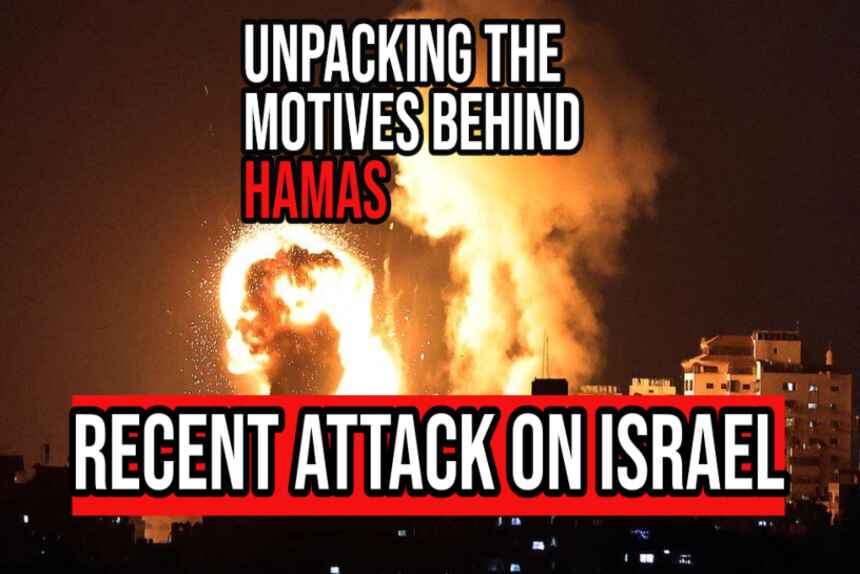In a bizarre development, Hamas launched a rigorously planned onslaught against Israel utilising air, sea, and land operations. We have to dig into a complex network of leads to that have been simmering for years whether we are going to comprehend the reasons behind this bold decision. Hamas and Israel are locked in a continuous pattern of warfare since 2005, in which Israel has carried out ferocious airstrikes in reaction to Hamas rocket attacks. Hamas views Israel’s often harsh responses as a regrettable but essential component of their strategy.
Hamas has been pushed in this prolonged battle by an array of compelling factors. The threat posed by lesser extreme groups, particularly Palestinian Islamic Jihad, which undermine Hamas’ rule in Gaza, is a crucial motivator for Hamas. These organisations have independently launched attacks against Israel, inviting wide-ranging ramifications for the entirety of Gaza. The ultra- right-wing Israeli the government, headed by the prime minister Benjamin Netanyahu, is making it clear that it desires the annexation of the West Bank and allowed the growth of illegal Jewish settlements there, that have made things worse.
Disputes between settlers and young Palestinians in the West Bank were sparked by this expansion, which has resulted in the emergence of the informally affiliated organisation known as the “Lions’ Den.” For popularity among Palestinian youth, this group competes with terrorist groups from Gaza. Additionally, Palestinians have viewed the visits by Israeli ministers to the hallowed Al-Aqsa Mosque as provocations. By claiming that these trips desecrate the site, Hamas has capitalised on this sentiment and gained the backing of Muslims all throughout the Arab and Islamic world.
The precise moment of the assault, known as “Operation Al-Aqsa Flood,” highlights Hamas’ conviction that Israeli activities amount to the spoliation of a treasured Islamic site. These 2020 Abraham Accords indicate that more Arab countries are signing peace accords with Israel, which may have had an impact on Hamas. A potential that Saudi Arabia and Israel would reach an agreement has raised the anxieties of the Palestinian people since it would diminish the pressure on Israel to work out a solution with them.
Hamas has demonstrated a willingness to support a cease-fire even though it does not recognise Israel should it return to its 1967 boundaries. Given the intricacy of the present Israeli-Palestinian disputes, Israel isn’t likely to consent to this demand, particularly if other Arab countries opt for normalising their relations with Israel.
The attack also occurs on the 50th anniversary of the unprovoked attack on Israel by Egypt and Syria during the Yom Kippur or Ramadan War of 1973. Hamas may attempt to repeat this success to demonstrate its capability to surprise Israel strategically.
Even while Hamas might find sympathy in the larger Arab world, significant financial support is uncertain. However, the deepening of the war may prevent Saudi Arabia from quickly normalising relations with Israel. The Abraham Accords’ Arab signatories are unlikely to renege on their commitments in opposition to Israeli reprisal. The conflict’s course is still up in the air. Israel’s north has already been the target of Hezbollah in Lebanon, with the level of its involvement dependent on Iran, its patron. In case Israel attacks Iran’s nuclear facilities, it may decide to keep Hezbollah’s capabilities on hand. The terrorists from the West Bank’s “Lions’ Den” may also start their attacks, opening up a third front against Israel. In addition, the possibility of a fourth front is raised by tensions among Israeli Jews and Arabs.
President Joe Biden’s assurance of support means that Israel will continue to receive aid on the global stage. However, Israeli action against Gaza is constrained by the presence of kidnapped Israeli citizens there. If Israel finds out where they are, it might use special forces to defend them from bombings that might put their lives in danger.Israel must also be mindful of how the outside world will perceive its response. Using overwhelming force against Gaza could turn Western public opinion against Hamas, despite the fact that Western governments have up until now supported Israel and ignored it.
In conclusion, the recent Hamas attack highlights how urgent it is for Israel to develop a thorough strategy for administering the Palestinian territories it governs. The existing situation, which is characterised by Israeli restrictions on Palestinians in Israel and the West Bank and containment of the crisis in Gaza, cannot continue. The complex regional circumstances necessitate a review of existing plans and a reaffirmed commitment to settling the Israeli-Palestinian issue.
